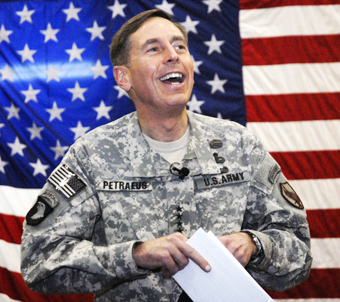Military Success Doesn't Buy Happiness
America and Afghanistan are ostensibly engaged in the same conflict, but may as well be fighting two separate wars.
A new poll of Afghans, sponsored by the Washington Post, ABC, the BBC, and ARD television of Germany, encapsulates much of what is happening in the war in Afghanistan and indirectly in debate and deliberations back here about the war. This is a counterinsurgency, after all, and in a counterinsurgency popular opinion is not just a reflection of the war; it is a large part of what the war is about.
 The NATO command certainly will point to measures of progress, even dramatic progress, in the areas where it has mounted its most concentrated military efforts, in Helmand and Kandahar provinces. Amid a surge of troops and reconstruction funds in those two provinces, the local residents see their life as markedly improving. Late last year 44 percent of those in Helmand rated their living conditions as good, but now 71 percent do. The greater availability of public services such as clean water and medical care is at the core of those perceptions. But this has not pushed political sentiment in NATO's preferred direction. Support for the Taliban in Kandahar is up sharply, with 45 percent now viewing the group favorably.
The NATO command certainly will point to measures of progress, even dramatic progress, in the areas where it has mounted its most concentrated military efforts, in Helmand and Kandahar provinces. Amid a surge of troops and reconstruction funds in those two provinces, the local residents see their life as markedly improving. Late last year 44 percent of those in Helmand rated their living conditions as good, but now 71 percent do. The greater availability of public services such as clean water and medical care is at the core of those perceptions. But this has not pushed political sentiment in NATO's preferred direction. Support for the Taliban in Kandahar is up sharply, with 45 percent now viewing the group favorably.
Even the part of the news from Helmand and Kandahar that is good is not scalable up to cover the entire country. NATO and the Afghan government do not and cannot deploy the forces that would be required to do anything close to full counterinsurgency over all of Afghanistan. And so the Taliban are scoring gains in the north and east. As Gilles Dorronsoro points out in these spaces, even in a best case scenario the Taliban will retain power in large parts of the countryside. If we are worried about bad guys finding sanctuary in Taliban-controlled territory, such territory will exist despite the military victories where NATO concentrates its forces.
Nationwide, two-thirds of Afghans rate the job that foreign forces are doing as fair or poor. Most Afghans accept their presence for now, but a plurality want the forces to leave sooner than next summer, rather than to stay longer. Overall sentiment toward the United States—which five years ago was unusually high for a majority Muslim country, with 83 percent of Afghans saying they were very or somewhat favorably disposed—continues its decline. The U.S. numbers were down to 51 percent favorable in December 2009; now it's 43 percent.
Unlike in Kandahar, the Taliban's favorable ratings are even worse—down close to single digits in most of the country, making it appear unlikely the Taliban could re-establish anything like the rule over most of the country it enjoyed before 2001. But the overwhelming majority of Afghans see the Taliban as a player that must be reckoned with in the traditional Afghan way, through negotiations. Seventy-three percent of Afghans favor negotiating a peace with the Taliban, while only 23 percent support a continued fight without negotiations.
On Afghan's most pressing concerns, the poll resembles a lot of U.S. polls in saying that it's the economy, stupid, and especially jobs. Asked to name the two biggest problems facing Afghanistan today, the economy slightly edged out security in being named most often.
General David Petraeus said in response to these results, “We clearly have to continue to provide the message to the Afghan people about why we're here and what it is that we want to do, not just for our own national objectives and coalition objectives but also for the people of this country and for the government of Afghanistan.” And so what exactly are those objectives, and do they still make sense given the nature of counterinsurgency and given Afghan attitudes? Or is it now mostly a matter of persuasion and public diplomacy?
An earlier poll of Afghan men in Helmand and Kandahar showed that more than 90 percent were unfamiliar with the terrorist attack of September 2001. It is going to be hard to explain objectives with baseline beliefs like that. America and Afghanistan are ostensibly engaged in the same conflict, but in important respects they may as well be fighting two separate wars.
